Allocricetulus (Mongolian) Hamster – Complete Care, Diet & Behavior Guide
Allocricetulus hamsters, also known as Mongolian hamsters,originate from Mongolia are small desert rodents from Central Asia built for survival in harsh conditions. This guide explains their natural behavior, diet, habitat setup, and health care to help pet owners provide the right environment.
Like other hamster species, they could be more well-known. Allocricetulus hamsters are adorable rodents that attract pet lovers. They have unique characteristics, behaviors, and extraordinary abilities.
Allocricetulus hamsters can even live in harsh conditions and environments. They are survivor hamsters on this Earth. They have remarkable abilities that help them survive in the harshest situations. Moreover, they are masters of their domain. Their fundamental skills can be seen in the wild.
Allocricetulus hamsters are charming rodents; however, they are usually unnoticed because of their cousin hamsters. Allocricetulus hamsters are an endless subject of fascination. They are professional burrowers, making a complex and intricate network of tunnels.
This article will discuss Allocricetulus Hamsters, including their size, traits, physical characteristics, diet, and health issues. A pet owner must know everything about these hamsters if they want to keep them as pets at home. Let’s discuss Allocricetulus hamsters in detail.
History of Allocricetulus Hamsters
Allocricetulus hamsters have a rich history. These hamsters have distinctive traits. Cricetinae is the subfamily of Allocricetulus hamsters, which were first found in Central Asia in the 19th century. They inhabit semi-arid and desert grasslands, where they build intricate burrows for safety and food storage.
Allocricetulus is a Greek word that means “different” or “another.” They show different behaviors from those of their other family members.
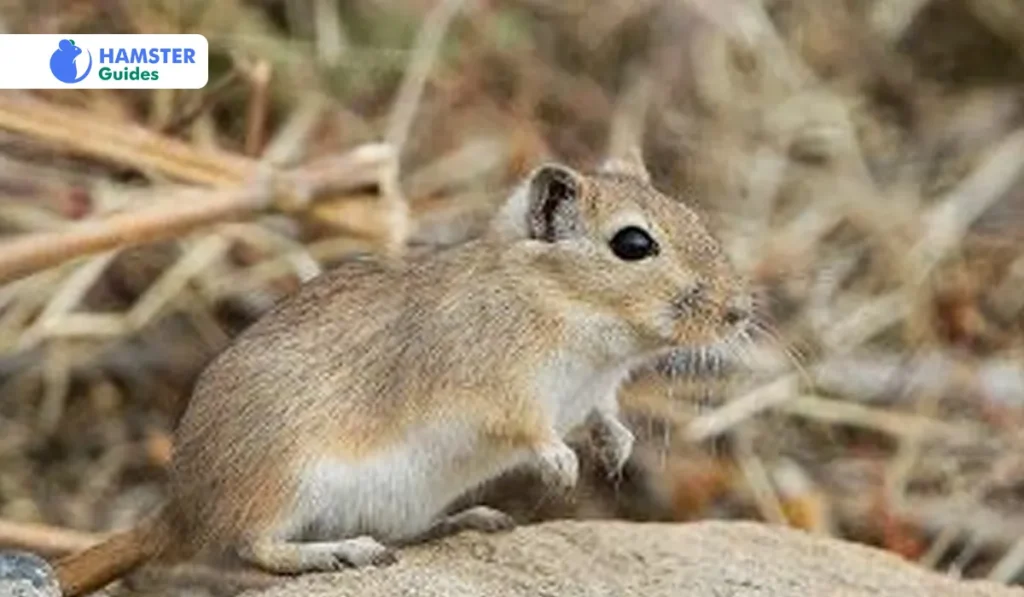
The Allocricetulus genus consists of two species: Allocricetulus eversmanni and Allocricetulus curtatus. German Zoologist Johann Andreas Wagner first founded Allocricetulus Eversmanni in 1841. These hamsters live in Kazakhstan, China, and Mongolia. They live in both arid and semi-arid areas.
Read More: A Full Guide to the Fascinating European Hamster
The Allocricetulus hamsters are habitual of living in harsh habitats, so they have unique survival strategies. These strategies help them live in extreme weather conditions and in times of scarcity when food resources are limited or even scarce.
Top Tip: Allocricetulus hamsters are solitary animals. They like to live alone and enjoy their own company. In a cage, combining two hamsters or any other animal with a hamster will make them aggressive, which can cause depression.
Allocricetulus Hamster In Wild
Allocricetulus hamsters, commonly known as Mongolian hamsters, are habitual in Central Asia’s harsh and challenging habitats. They live in arid and semi-arid regions. These areas are best for burrowing.
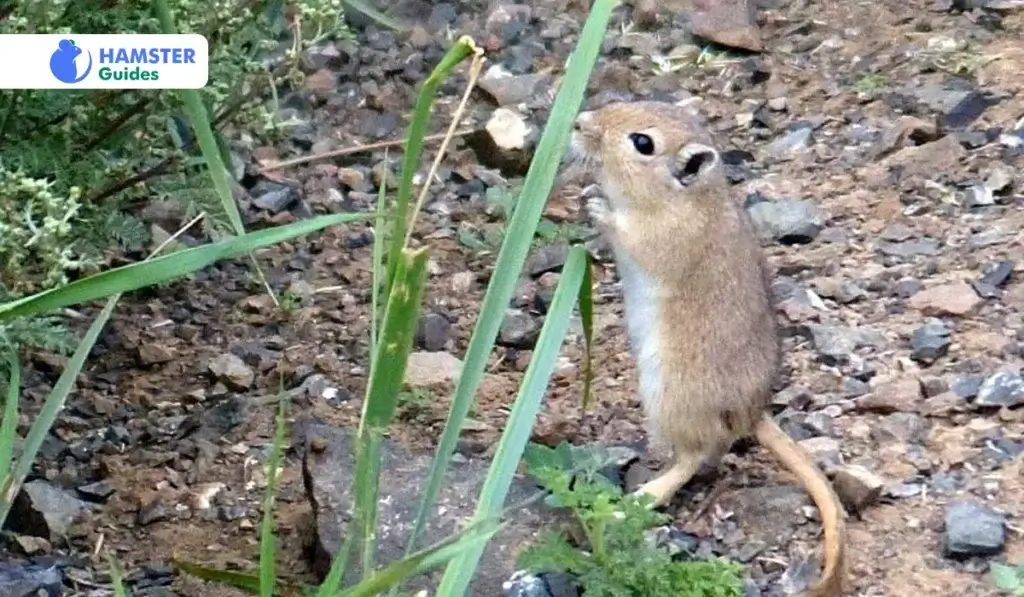
Professional Burrower
Allocricetulus hamsters are professional burrowers. They make a complex and intricate network of tunnels, which are the safest place for the hamsters. They make several tunnels, all for different purposes. They also make a separate, warm, comfortable, and secure tunnel for newborn babies.
Read More: Do Hamsters Eat Their Babies?
Allocricetulus hamsters use separate tunnels for food storage. This stored food helps them a lot in times of food scarcity. At night, they search for food while roaming around their surroundings. When they see food, they fill their cheek pouches and empty them in their tunnels.
Allocricetulus hamsters make long tunnels, protecting them from predators and saving their lives in extreme weather conditions.
Nocturnal Behavior
Allocricetulus hamsters are nocturnal and most active at night. This habit saves them from drafts, heat strokes, and extreme weather conditions. They explore their environment at night and do one more thing: they search for and store food at that time.
Read More: Are Hamsters Nocturnal?
Allocricetulus Hamster In Captivity
In captivity, Allocricetulus hamsters have only a controlled environment. They can not move freely and explore their surroundings like in the wild. Pet owners ensure a natural environment necessary for a hamster’s care, healthy life and healthy growth.
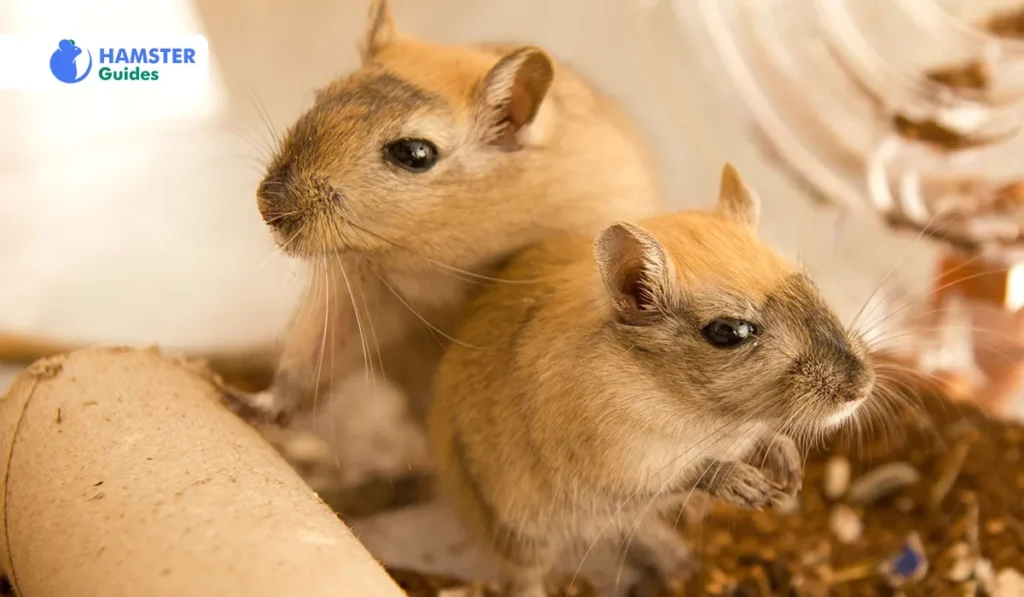
Allocricetulus hamsters need a lot of space to live. Their cages must contain all the essentials, such as food, water, an exercise wheel, and tunnel digging. The cage should be at least 31* 20 inches and designed so that the hamster can have all the important facilities.
Provide chewable toys for the healthy growth of hamsters’ minds and bodies. Also, provide them with the best bedding material in the cage. Allocricetulus hamsters need a well-balanced diet.
Balanced Diet
Allocricetulus hamsters need a well-balanced and nutritional diet. Food portion size should be controlled because excess can be health hazardous. Give them healthy food. Healthy food is important for the physical and mental growth of Allocricetulus hamsters.
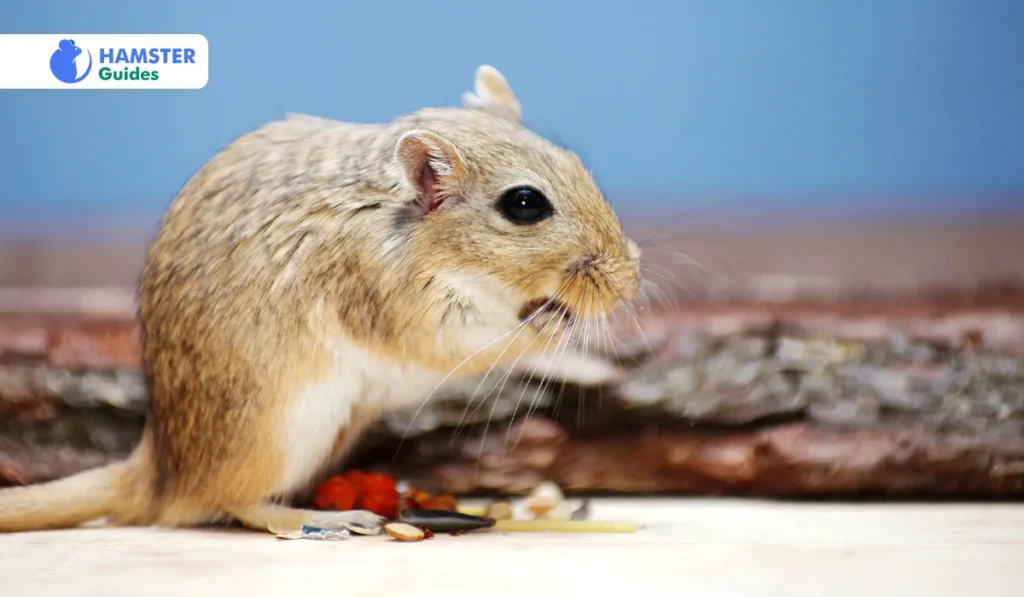
Many high-quality hamster pellet foods form the base of their nutritious diet. Before giving this food, make sure it is specifically for Allocricetulus hamsters. Always give them fresh fruits and vegetables. Avoid giving citrus fruit, as citrus fruit can cause acidity in your hamster.
Read More: Can Hamsters Eat Pears?
Skilled Burrowing
Allocricetulus hamsters are professional burrowers. They dig long tunnels. They make a complex and intricate network of tunnels. They make different chambers in tunnels. Each portion is for a different purpose. They use a tunnel to store food, and they use another tunnel for their upcoming babies.
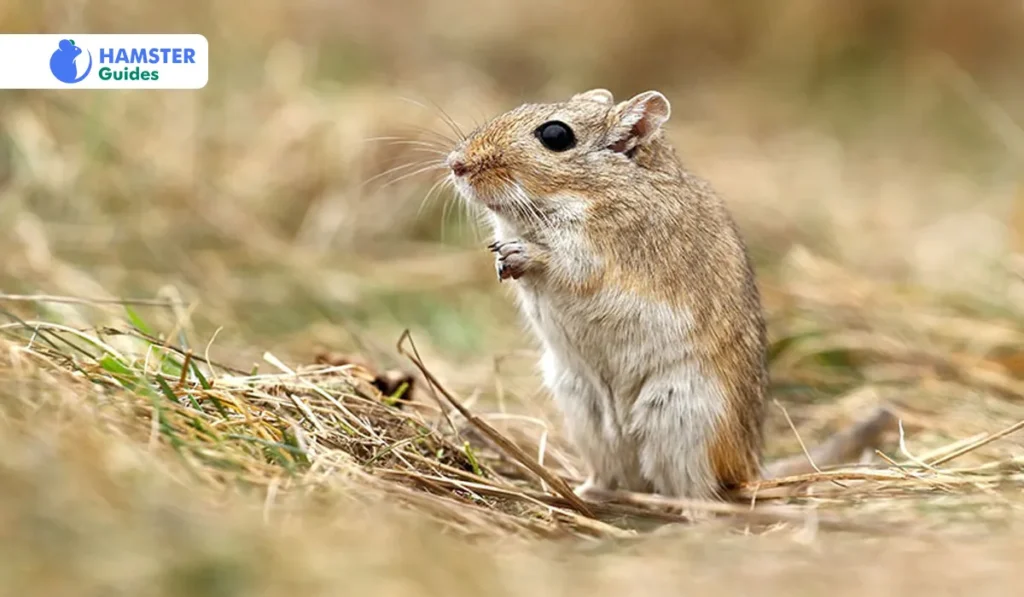
It is necessary to provide a burrowing facility for your hamster in a cage. They should also have the best bedding material, such as aspen shavings. Allocricetulus hamsters consider the tunnels as the safest place. They hide themselves here when any predator attacks them.
Appearance of Allocricetulus Hamsters
Allocricetulus hamsters look like other hamsters; however, from a distance, they look different from other rodents. These small-sized hamsters are very strong rodents known for their distinct and attractive looks. The fur color of Allocricetulus hamsters is a mix of sand and greyish brown. The undertones of these hamsters are always lighter and often creamy white mixed with darker shades.
Read More: Grey Dwarf Hamsters: A Comprehensive Guide
The Allocricetulus hamster has a small and robust body, strong limbs, dark eyes, and round ears. Its cheeks are significant, with a lot of space to store food in cheek pouches. These hamsters fill their cheeks with food and transport it to their tunnels. Their tails are short compared to their size and covered with fur.
| Hamster Characteristics | Specifics |
| Size | 10 to 13 centimeters |
| Weight | 30 to 50 grams |
| Commonly Addresses As | Mongolian Hamster |
| Color | They are a mix of sandy and grey tones. |
| Nutrition | The diet of Allocricetulus hamsters consists of insects, seeds, and grains. |
| Lifespan | The maximum lifetime of the Allocricetulus hamster is 1 to 2 years. |
| Minimum Habitation Size | 360 square inches |
| Unique Element | Adaptation to harsh habitats is the unique trait of the Allocricetulus hamster.AllocricetulusAdaptation to harsh habitats is the unique trait of the Allocricetulus hamster. |
Top Tip: Maintain the cage temperature. It should not be more or less. It should be moderate. A stable temperature for Allocricetulushamsters is 65° to 75° F. Protect them from direct sunlight. Make their cage safe and sturdy.
Reproduction of Allocricetulus Hamsters
Allocricetulus hamsters are seasonal breeders. They start breeding in the spring and summer when food is plentiful, which is their mating season. These hamsters are solitary animals; they like to live alone and are dominant. So, when you introduce males and females, observe their behaviors. If you see them fighting, you should immediately separate them.
The gestation period of the of the hamster is short, about eighteen to twenty-one days. During these days, mother hamsters prepare nests for their newborn baby. A calm and safe tunnel is important for a newborn. The average size of the litter is about four to ten pups.
hamster is short, about eighteen to twenty-one days. During these days, mother hamsters prepare nests for their newborn baby. A calm and safe tunnel is important for a newborn. The average size of the litter is about four to ten pups.
The mother and newborn hamsters are blind and hairless. They depend entirely on their mothers. The mother hamster feeds them. By the time they start growing, they become weaned within a few weeks.
Mothers Care For Baby Hamster
A mother hamster loves all their pups. Female hamsters take good care of their babies. They nurse them. For a pet owner, avoiding touching the newborns and their mothers and minimizing your interaction with them is necessary. If you disturb them, it can cause stress to their mother.
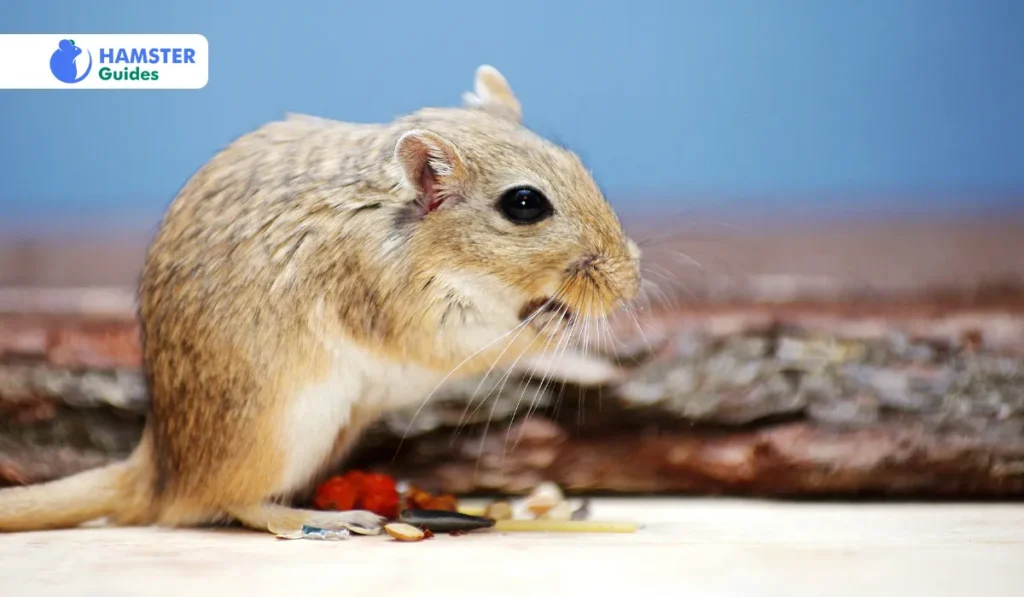
A mother hamster feeds their babies and protects them from attackers. A mother hamster also teaches their babies some important survival skills that are necessary for them. Allocricetulus hamster reaches sexual maturity when they are two months old.
If you want to avoid aggression in hamsters, separate them early. When these newborns are almost five to six weeks old, separate them; it also avoids early breeding.
Breeding In Captivity
Pet owners can control hamsters’ breeding patterns when they live in cages. They can allow and avoid breeding. The pet owner should carefully select the breeding pair and monitor the interactions of Allocricetulus hamsters.
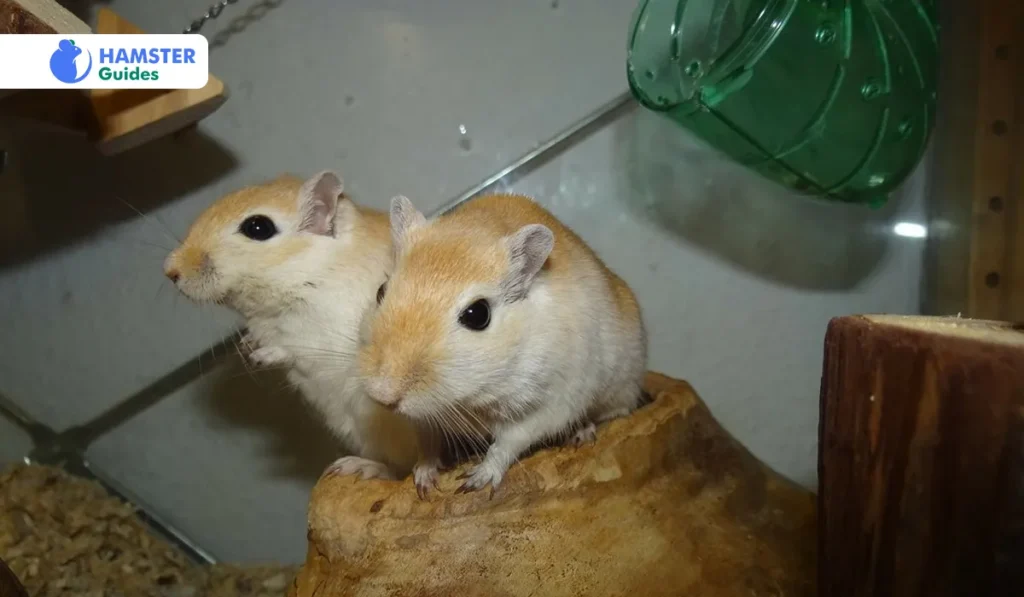
If you want to prevent hereditary health problems, choose a healthy hamster with excellent genetics. It is a sign of responsible and healthy breeding.
Diet And Nutrition of Allocricetulus Hamsters
A well-balanced and nutritious diet is necessary for the well-being of Allocricetulus hamsters. These are omnivorous. They require healthy food for their optimal health. Their diet includes seeds, grains, fruits, vegetables, and high-quality hamster food pellets. They also like protein. For the healthy development of Allocricetulus hamsters, a balanced and nutritious diet is required.
Read More: How Long Can Hamsters Go Without Food?
Fruits And Vegetables
Fresh fruit is good for Allocricetulus hamsters’ health. Dietary fiber, vitamins, and minerals are also important for their digestive health. All these health essentials are found in fruits and vegetables. Pet owners must know the amount of food they will give Allocricetulus hamsters. A well-rounded diet includes everything in small portions.
Water
Maintain a high amount of water in a hygienic container. The Allocricetulus hamster’s access to clean, pure, and fresh water should not be compromised. Make sure that your hamster never gets dehydrated. Check the water bottle of your hamsters periodically; if it is empty, refill it. In warmer weather conditions, Allocricetulus hamsters need a lot of water to avoid dehydration.
Read More: How Long Can Hamsters Go Without Water?
Seeds And Grains
Seeds and grains are also essential for Allocricetulus hamsters. Sunflower seeds, oats, and millet are the best sources of minerals, fats, and vitamins for Alocricetulus hamsters. A pet owner can also give hamster pellet food to their pet, as it is specially made for them.
Read More: Can Hamsters Have Walnuts?
Dietary Preference Of An Individual
Every Allocricetulus hamster can have a different taste and individual preferences. They can differ from other hamsters in the case of food. When you introduce a new food to your pet, monitor them. Furthermore, overfeeding should be avoided as it can cause disease.
Schedule For Feeding
Allocricetulus hamsters are nocturnal creatures, and they are most active at night. So, the best time to feed them is in the evening. Avoid overeating with your furry friend. Give them small portions of food for the whole day.
Read More: How To Take Care Of A Hamster?
Health Of Allocricetulus Hamster
It is important to maintain the overall health of Allocricetulus hamsters for their happiness, long life, and health. If you don’t take care of your hamster, it can cause serious health issues, leading to some diseases. However, it is important to take care of your hamster.
Give them a well-balanced diet—nutritious food that contains all the essentials. If you want to care for your hamster properly, it is important to know about their health issues and how to recognize them. If you see any signs of illness, ask for veterinary help.
Additional Information: Clean the cage of Allocricetulus hamsters regularly. Cleanliness is critical if you want to see your hamster healthy and happy. Remove any soiled bedding from the cage daily. Sanitize the cage regularly to prevent bacteria from feeding on it. Cleanliness prevents many diseases.
Health Issues Related to Allocricetulus Hamsters
If you don’t properly care for your Allocricetulus hamster, it can cause illness. Long-term sickness can lead to serious health issues. Let’s talk about some serious health issues related to these hamsters.
Respiratory Infection
Attacks from drafts, poor ventilation, or bacteria can cause respiratory infections in Allocricetulushamsters. Sneezing, lethargy, continuous discharge from the nose, and breathing difficulty are symptoms of respiratory tract infection. When you see these symptoms, get help from the vet. If you don’t take it seriously, it can lead to severe problems.
Skin Issues
If Allocricetulus hamsters are not properly cared for, diseases can attack them. Skin issues like ringworm, mites, and fungal diseases can attack Allocricetulus hamsters. Symptoms of these skin problems include itching, hair loss, red patches, and scabs.
A clean cage, proper nutrition, and a good environment can prevent these skin issues. Regularly cleaning the cage and hamster will make your hamster healthy. However, if you want to cure these skin-related issues, seek help from a vet and go for treatment.
Obesity
Obesity is a common health issue in Allocricetulus hamsters. In the cage, they have access to excess food rich in calories and fewer opportunities for exercise, which is why they gain weight.
Overfeeding and small cages can also cause weight-gaining problems in hamsters. If you want to keep your Allocricetulus hamster healthy, feed them in small portions and control their diet. Moreover, it gives them space for physical activities. This way, you can avoid weight gain issues in your Allocricetulus hamsters.
Dental Issues
Genetic factors, an imbalanced diet, and poor chewing habits can cause dental problems Allocricetulus hamsters. Dental issues include malocclusion, which can be symptomatic by weight loss, difficulty eating, and drooling. Regular checkups of teeth and chewing toys can reduce the risk of dental issues in Allocricetulus hamsters.
Read More:Can Hamsters See in the Dark?
What Are The Signs Of Illness?
A pet owner must be observant. He must be active all the time. A Pet owner should properly care about their hamsters. He must monitor their habits. Their eating habits must be good all the time.
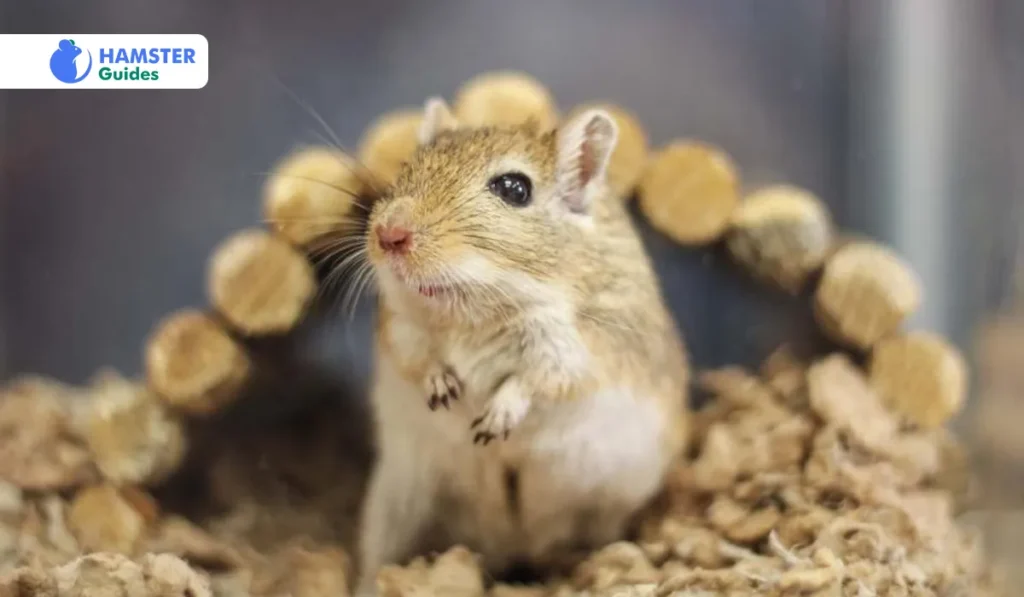
However, if you see any change in eating habits or appearance, your Allocricetulus hamster is not well. There must be a problem. You can recognize it by their symptoms:
If your hamster shows any of these signs, there must be some issue; go to your veterinarian and seek help. Early diagnosis will help your Allocricetulus recover and become healthy again. Pet owners need to prioritize their hamster’s health.
Proactive Measure For Allocricetulus Hamsters
If a pet owner wants to ensure the well-being of Allocricetulus hamsters, it is important to take proactive measures. These are some strategies that ensure the health and happiness of Allocricetulus hamsters.
Read More: Golden Hamster or Syrian Hamster: Everything You Need To Know
Grooming Of Allocricetulus Hamster
It is important to clean your hamster regularly. Grooming Allocricetulus hamsters is also important. It increases their beauty and enhances their appearance. These grooming routines require extra time and attention.
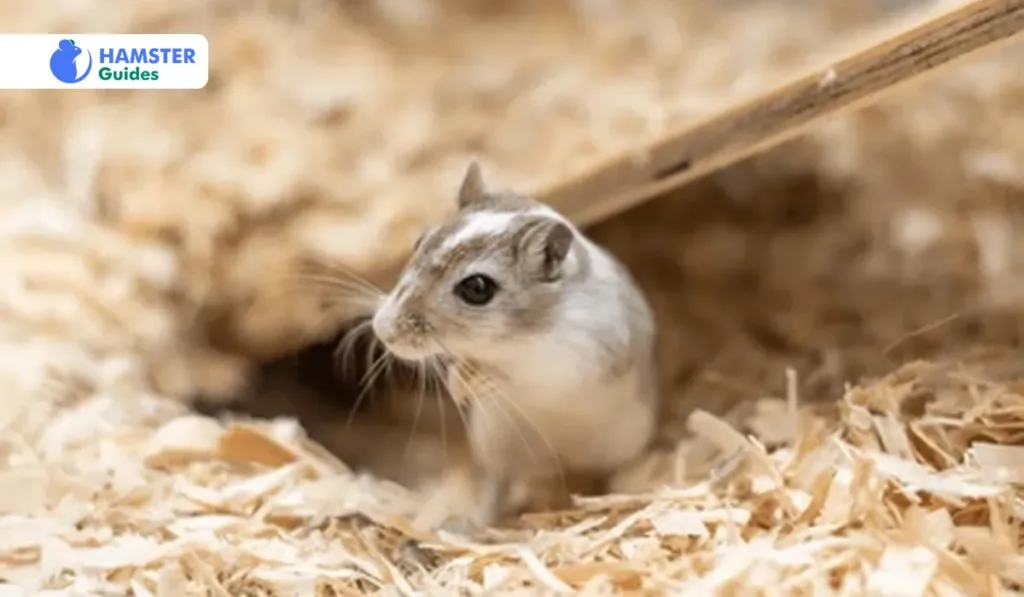
| Nail Care | Ensure that the cage has a rough surface. Because their habitat has a rough surface, the Allocricetulus hamsters need fewer nail trims, as their nails erode naturally. |
| Dental Care | To maintain healthy teeth, give them chewable toys and allow them to chew food. The Allocricetulus hamsters must gnaw on hardwood, mineral berries, and stems to help wear down the teeth. |
Additional Information: Allocricetulus hamsters’ habitat must be calm. They don’t like noise, which causes stress and fear, which can then lead to depression. Reduce loud noises. The pet owner must ensure a calm and secure environment for Allocricetulus hamsters.
Natural Environment
A natural habitat is everything for the Allocricetulus hamster. They love to live in the natural environment, so give them a similar habitat. Make a friendly environment where a hamster can move freely—an environment where a hamster can explore and play. You must check the home arrangements for the Allocricetuluss hamster.
Read More: Do Hamsters Live in The Wild?
Cage Setup
Allocricetulus Hamsters are tiny but need wide space to explore and dig long tunnels. These are active rodents. For Allocricetulus hamsters, use at least 24 inches in length, 12 inches in breadth, and 12 inches in height. For effective use, glass habitats or cord cages should be used. Moreover, ventilation is necessary.
The cage setup should be away from direct sunlight. When designing the cage, consider creating different levels and zones so the animals can explore, play, and exercise.
Exercise is very important for Allocricetulus hamsters. It is important for their physical and mental health, maintains their health, and keeps them active.
Temperament And Behaviour
The Allocricetulus hamster shows different behaviors and has unique characteristics. It is nocturnal and most active at night. The hamster’s keen senses of smell and hearing make it more energetic at night. It loves to explore its surroundings at night.
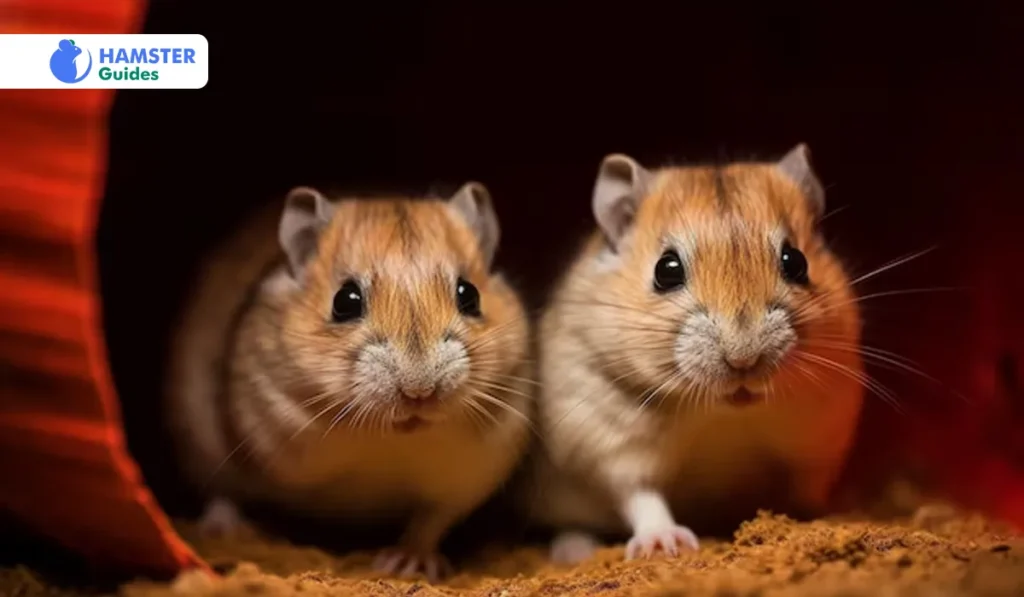
The Allocricetulus hamsters are professional burrowers. They dig a long, complex network of tunnels safe for nesting. They like to spend most of their time in these activities, which provide them with safe, hidden places to raise their babies.
When To Ask For Veterinarian Help?
Veterinarian help is important for hamsters in every way. When you introduce something new to eat, first ask the veterinary doctor. If you see any signs of illness, go for checkups. Regular checkups are important for Allocricetulus hamsters.
If you see a sudden drop in the health of Allocricetulus hamsters, ask for help from a veterinarian. A licensed veterinarian can identify the problem and cure it very well. The vet’s treatment can make your hamster healthy again.
The Final Words
The Allocricetulus hamsters are unique rodents of miniature animals. They have unique traits and attributes that differentiate them from other hamsters. This species’ unique characteristic is that they can live in any weather condition. They are distinct combinations of appearance, disposition, and needs.
After learning about their behavior, it is clear that they are solitary animals. They enjoy their own company. For exploring purposes, they like to go out at night. They are adorable creatures that require gentle handling, care, patience, and love.
Hope your hamster enjoys its meal!
Related Questions









Leave a Reply